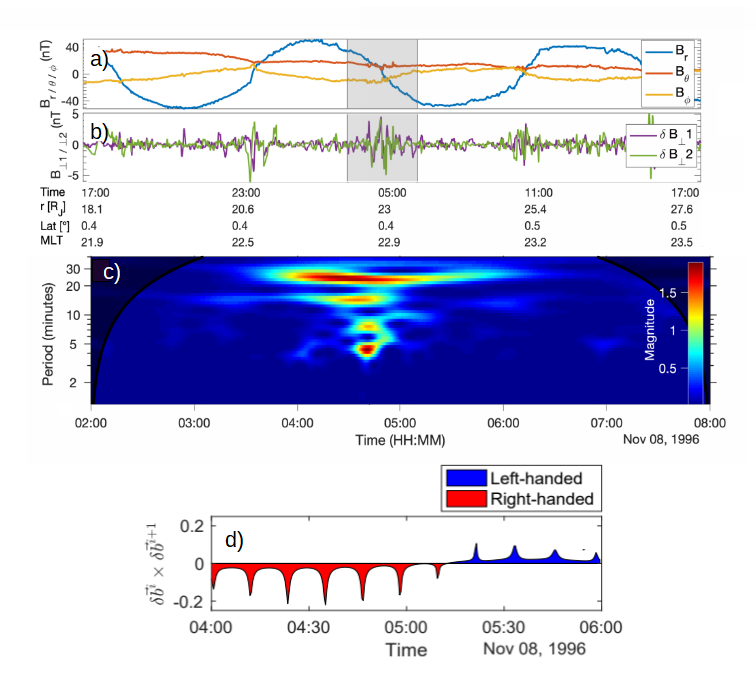MIST
Magnetosphere, Ionosphere and Solar-Terrestrial
First evidence for multiple-harmonic standing Alfvén waves in Jupiter’s equatorial plasma sheet
By Harry Manners (Imperial College London)
Ultra-low-frequency (ULF) magnetohydrodynamic waves carry energy and momentum through planetary magnetospheres, corresponding to perturbations on large spatial-scales. These perturbations can lead to global oscillations of the magnetic field known as field line resonances (FLRs). While ULF waves and FLRs have been studied extensively in the terrestrial magnetosphere, relatively little literature exists concerning the same phenomena in magnetospheres of the outer planets.
We have used magnetometer data from the Galileo spacecraft to search for ULF wave-power at Jupiter, specifically in the thin, dense equatorial plasma sheet (see panel a of Figure). By removing the background magnetic field we were able to isolate perturbations in the direction transverse to the background field (panel b). We obtained frequency-time information via wavelet transforms of the magnetic-field residuals.
We found evidence for a multiple-harmonic wave structure isolated in the equatorial plasma sheet, on 8th November 1996. Four harmonics were detected, with periods ranging from 4 to 22 minutes (panel c).
We band-pass filtered the transverse field components to obtain a ~1 nT contribution from each harmonic. Subsequent polarization analysis revealed reversals in handedness in each signal consistent with the structure of a multiple-harmonic standing Alfvén wave (panel d). The same analysis suggests all of the detected harmonics are odd modes, with no evidence to support the presence of even modes. We currently have no explanation for the absence of the even modes, but speculate that it is a consequence of the symmetry of the driving mechanism with respect to the magnetic equator.
For more information, please see the paper:
Manners, H. A., & Masters, A. (2019). First evidence for multiple‐harmonic standing Alfvén waves in Jupiter's equatorial plasma sheet. Geophysical Research Letters, 46. https://doi.org/10.1029/2019GL083899

Figure: a) Magnetic field data from the Galileo spacecraft during 8th November 1996. b) Transverse magnetic field residuals, showing ULF wave packets. c) Wavelet transform of one of the transverse components, showing coincident enhancements in wave power at 22, 14, 7 and 4 minutes. d) Reversals in the handedness of the 22 minute wave signal, consistent with standing Alfvén waves.